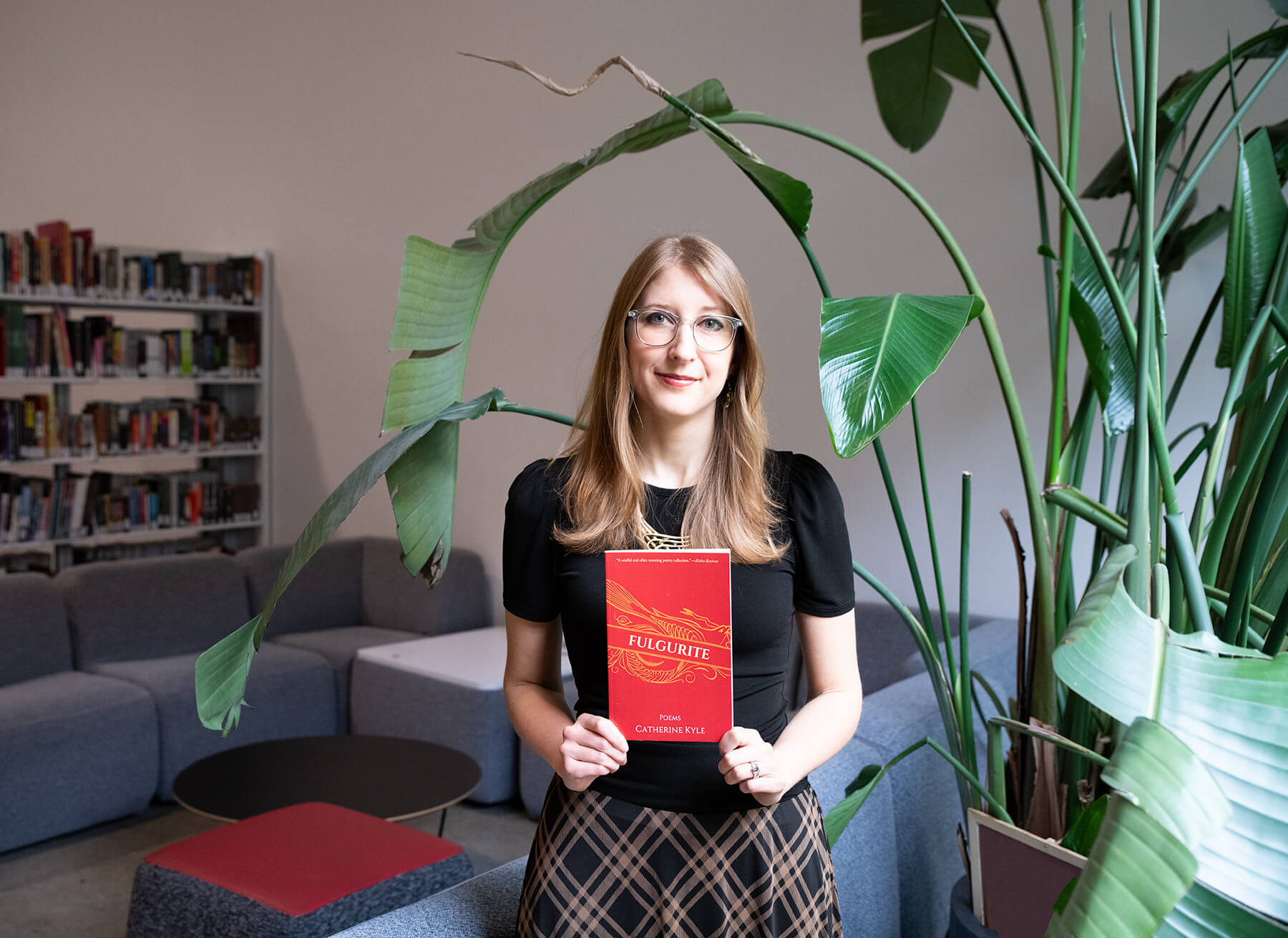In the world of academia, DigiPen humanities professor Dr. Catherine Broadwall is a bit of an anomaly. She’s an analytical scholar and award-winning poet with both a Ph.D. in English and an MFA in creative writing, a patron of the literary arts who celebrates the great masterworks of classical antiquity and present-day media like games and anime in the same breath.
“I think it’s a really exciting time to be a storyteller. I always tell my students, these things don’t have to exist in competition with each other. It’s more like a family tree,” she says. “I do see ancient plays as being in a family with visual novels and Twine games — or video games in general. They don’t have to be in opposition, and I think they can have interesting conversation.”
Nowhere is this philosophy better reflected than within her own classroom at DigiPen, where Broadwall currently teaches a rotating mix of courses on literature, composition, and creative writing. Not only does she infuse her course syllabi with an amalgam of writers and genres from across time and place, she actively welcomes students to make their own connections to the works they already know and love through classroom discussion.
“We’re talking about Shakespeare and we’re talking about visual novels,” Broadwall says with a laugh.
Although Broadwall was no stranger to the world of games when she joined the Department of Humanities and Social Science in 2021, having grown up with home consoles and Japanese role-playing games, she does credit her students and colleagues with opening her eyes even further to the narrative potential of the medium.

“If they get a sense of me and my interests and they recommend something to me, I will try to play it or watch it, because they’ve given me some really amazing recommendations,” Broadwall says, citing recent examples like Undertale and GRIS, the latter of which ended up becoming the subject of an essay she wrote after playing the game. “I’ve also gone on to recommend some of those things to other people.”
It was also thanks to a friend’s recommendation that Broadwall ended up at DigiPen in the first place. That friend was Bungie designer and former DigiPen adjunct instructor Jennifer Ash, who had suggested the Redmond college as a potential teaching post while Broadwall was still completing her studies on the East Coast.
“She said, ‘You know where I feel like you’d be really perfect is DigiPen. You love video games, and you love sci-fi and fantasy. You love teaching. You should keep an eye out for things there,’” Broadwall recalls. “When she said that, I looked up the department, and I thought, ‘Oh my gosh! This would be amazing.’”
Not long after, feeling homesick for the Pacific Northwest on New Year’s Day of 2021, Broadwall decided on a whim to check the DigiPen website and saw the faculty job posting she was hoping for.
“It was one of those my-heart-was-racing kind of things, where it was just like — this is it! This is the job I want,” she says.
When she’s not teaching or preparing for classes, there’s a good chance you’ll find Broadwall hard at work adding new layers to her already substantial literary output. It’s yet another area where her open embrace of genre and subject matter comes into play. As the author of two full-length poetry collections and a forthcoming memoir, as well as several poetry chapbooks and journal publications, Broadwall employs an age-old medium to communicate stories and ideas that are very much of the moment.
It was one of those my-heart-was-racing kind of things, where it was just like — this is it! This is the job I want.
Moving freely back and forth between fantasy and realism, Broadwall’s stories often invoke elements of magic and the supernatural as a lens to explore real-world issues. She likes to describe her first full-length poetry collection, 2019’s Shelter in Place, as “cyberpunk witch poems.”
“It was inspired by cyberpunk — that kind of urban fantasy,” she says. “But it was also inspired by reading really disturbing news headlines about people taking an Uber to the hospital instead of taking an ambulance because they were afraid of the charge — things like that. It made me wonder: Are we in the dystopia that we fear?”
Her most recent poetry collection, 2023’s Fulgurite, takes inspiration from a literary genre called domestic fabulism, which incorporates both the magical and the mundane, using the former as a means to amplify or examine the profound meaning found in everyday places, peoples, and experiences.
“There are some poems inspired by fairy tales. There are some that have ghosts,” Broadwall says. “A lot of the poems are set in homes, but there’s still that thread of magical things that are happening, for better or worse.”
It’s her forthcoming project, however, that may prove to be her boldest experiment yet. Titled Water Spell, Broadwall describes her work in progress as a memoir consisting of various creative nonfiction essays, most reflecting on a piece of popular media through a literary practice known as “ekphrasis.” The word comes from the ancient Greek and describes a type of writing that attempts to comment on or add to the emotional essence of visual art using words.
“Traditionally, ekphrasis is on things like pottery or paintings, but people still do it in contemporary times. It’s been done now on photographs and things like that,” Broadwall says. “What I personally had never seen before, though it may be out there, was ekphrasis applied to other visual media like film, animation, and video games.”
In Water Spell, set to be released in 2025, Broadwall examines the formative cultural artifacts from her youth and adulthood — from popular “magical girl” series like Sailor Moon and Magic Knight Rayearth to Pixar’s Inside Out — to reflect on the life lessons they instilled, whether consciously or otherwise.
“It really is a love letter to the texts that mean a lot to me, while also telling my own story,” Broadwall says.
Her story as of late has been one marked by an increasing number of accolades. In addition to being nominated last year for a Pushcart Prize, Broadwall won the Paula Svonkin Creative Arts Award, presented last October on behalf of the PAMLA 2023 humanities conference for a lyric essay she submitted.
As well-earned as her rising success may be, Broadwall remains grateful — and a bit hesitant to take too much credit for herself. While hard work and practice certainly play a role in a writer’s journey, she says, it’s not the whole picture.
“There is an element of discipline and planning that goes into it, but there’s also an element that is ephemeral and almost magical to me. And I have talked to other writers who agree,” Broadwall says. “Some people call it the muse or give it other names. But there is, at least for some of us, a piece of making art that feels outside your control. I do sometimes feel like ideas move through me, and that’s exciting.”
